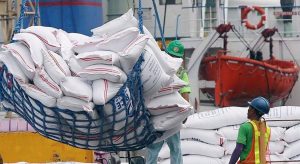THE Department of Agriculture (DA) is holding off on plans to lower the maximum suggested retail price (MSRP) of imported rice pending an assessment of the impact of the war in Iran on commodity prices.
Affected by the delay is the plan to lower by July 1 the MSRP for imported rice of the 5% broken-grain variety to P43 from P45 per kilo, Agriculture Secretary Francisco Tiu Laurel, Jr. told reporters.
“We will hold it in abeyance,” he said, in case there are “market shocks” resulting from the Israel-Iran war, which has since attracted US intervention.
Mr. Laurel said the DA is expected to come up with a final decision by next week, though he expects a delay of about a month or two “to gain a clearer picture of where global prices are heading.”
The DA first implemented the MSRP for imported rice on Jan. 20, with an initial setting of P58 per kilo.
The DA has said that the MSRP settings were lowered following the drop in world rice prices after India lifted its export ban on non-basmati white rice and as demand waned.
Mr. Laurel, said the DA still plans to introduce an MSRP for imported pork in August, with the final pricing will be determined closer to the rollout.
“The market is extremely fluid. Any forecast I make now might not be accurate even an hour later,” he said.
Mr. Laurel noted “heightened geopolitical risk” following the US air strikes on three nuclear sites in Iran early Sunday.
Gasoline prices are expected to increase by P2.50 to P3.20 per liter this week, while diesel prices by as much as P4.80 per liter.
Iran has since threatened to block tankers transiting the Strait of Hormuz, through which many of the other oil-producing countries in the Persian Gulf ship their petroleum.
Mr. Laurel warned that surging oil prices could have a cascading effect across the agricultural sector, with fisherfolk already suffering from higher fuel prices.
The DA is expected to release fuel subsidies for fisherfolk soon, he said, adding that the department may tap its quick-response funds.
The 2025 national budget set aside P2.5 billion in fuel subsidies for public transport operators, farmers, and fisherfolk.
The trigger for the release of the subsidies is $80 per barrel on a designated crude oil benchmark.
Mr. Laurel said farmers could also be subject to increased fertilizer costs next year, though he noted that fertilizer for the current planting season has already been procured.
“Rising oil prices also mean higher transportation costs for fertilizers and other agricultural inputs,” the DA said. — Kyle Aristophere T. Atienza

